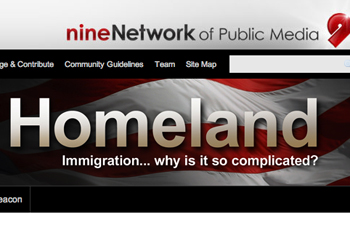Fresh from their ambitious multi-city Facing the Mortgage Crisis project, KETC/Channel 9 in St. Louis has launched a new community-based news project on another hot topic: immigration.
Homeland aims to “apply public media sensibilities, expertise and capacity to address a complicated and polarizing issue,” said Amy Shaw, KETC’s vice president of education and community engagement. The project includes a website that will feature original content created by community members and KETC staff, a series of facilitated community meetings in the St. Louis area and across Missouri, and a four-hour nationally broadcast television series. This combination, said Shaw, is designed to “push the boundaries of what public media can do.”
According to the site:
The Homeland initiative is the embodiment of what public media can do well — we generate awareness around the important and complex issues that need to be addressed in our communities, and then we create impact by mobilizing people to address these issues. In the process of talking to people throughout our region, we want to show, analyze and present what we learn. We’re not going to tell people what we think about immigration or what is right or wrong, good or bad. We intend to help people embrace and understand the complexity of important issues to help communities address them in a more authentic, rational way.
NineAcademy Trains Community Members
Shaw said the project is “rooted in needs of the community,” and it is clear that KETC takes community engagement seriously. Homeland is teaming up with KETC’s NineAcademy, a free community media program that trains locals in shooting, editing, and storytelling. The best productions will be featured on the Homeland site and on KETC.
Although NineAcademy has already trained community members ranging from middle schoolers to senior citizens, KETC is intent on “meeting people where they are.” Aware that some community members lack internet access, KETC staff has made sure that phone, face-to-face and snail-mailed correspondence is valued as much as online interaction. For example, KETC is experimenting with the idea of “conversations in a box” — mobile storytelling kits, including inexpensive digital video recorders, that are mailed to community members. When they have finished recording their stories, they send the kits back to KETC for redistribution.
So far, according to Shaw, promotion for the project has been minimal, as the project website is still developing.
Five Sections of Site
At present, the site includes five sections that demonstrate the participatory and collaborative nature of Public Media 2.0, in varying degrees.
360 Degree Perspectives is a blog that explores multiple perspectives on immigration issues, based on KETC’s meetings with community members from all spots on the political spectrum, including Tea Party members, far-left groups, and the very wide swath of Americans who don’t currently identify with a particular political point of view.
Fact vs. Myth takes a nuanced look at some of the common information and misinformation surrounding the immigration debate. Check out this Fact vs. Myth video created by a NineAcademy graduate DeAnna Tipton:
Your Voice is a discussion forum for community members. Right now, the conversation is heavily populated by KETC staff, but Shaw is confident that the balance will shift over time to allow for more user-directed conversation.
Homeland Series is a behind-the-scene look at the making of the four-hour series that will air in 2011. The broadcast element of this project is, as Shaw explained, “a piece of puzzle,” not the be-all end-all culmination of the project. In fact, no pieces related to the project have aired yet, although there has been much activity both online and face-to-face. Community meetings have shaped the entire direction of the project, including the decision to create the four-hour broadcast piece.
Finally, From the Beacon showcases related work from KETC’s newspaper partner, the St. Louis Beacon. The Beacon was a partner in the Facing the Mortgage Crisis project as well, providing cross-platform news coverage to the benefit of both organizations.
Challenges
Although the project is developing smoothly, Shaw said that, “We were a bit naive in considering how challenging it would be to take on one of the most difficult and challenging issues of our time.” As polarizing as this issue may be, the tone on Homeland remains congenial with only minimal moderation, indicating perhaps that people are tired of the sensationalized, black-and-white coverage of the issue that is often provided by traditional media.
In addition to the polarizing nature of the subject matter, KETC is also dealing with the fact that the station has not traditionally been a news organization. Now, as they experiment with community-based public affairs coverage, the team must constantly evaluate what works and what doesn’t or, as Shaw put it, “go through a daily recalibration.” The lessons that KETC’s staff learn through this project could very well inform a powerful community engagement model for other stations around the country.
In the coming months, the Homeland team will continue to tweak the design and engagement aspects of the project in order to make the site more community-oriented. KETC is also working on some major internal shifting, and a rebranding effort to highlight the station’s overall push toward public engagement. In the future, KETC will be taking on more than one in-depth community engagement project at a time. The subject matter for these future projects will come from — where else? — the community.
Katie Donnelly is Associate Research Director at the Center for Social Media at American University where she blogs about the future of public media. With a background in media literacy education, Katie previously worked as a Research Associate at Temple University’s Media Education Lab in Philadelphia. When she’s not researching media, Katie spends her time working in the environmental field and blogging about food.

